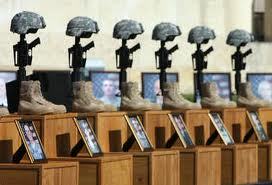WASHINGTON — Maj. Nidal Hasan, accused in the murders of 13 people and the attempted murders of 32 others in the shooting spree at Fort Hood, Texas, in November 2009, appears to be the toughest kind of terrorist to spot: a lone wolf who plots without the overt support of domestic cells or foreign sponsors.
Still, the attack did not come as a complete surprise to some in the Army and the FBI, and that makes this incident all the more tragic.
Our Senate committee’s 14-month investigation of the Fort Hood killings has concluded that the Department of Defense and the FBI “collectively had sufficient information to have detected Hasan’s radicalization to violent Islamist extremism but failed both to understand and to act on it.”
The deaths at Fort Hood could and should have been prevented. The Defense Department’s failure to acknowledge the threat of violent Islamist extremism within its ranks, coupled with organizational and communication flaws in the FBI’s counterterrorism operations, contributed to the tragedy.
At various times while stationed at Walter Reed Army Medical Center, Hasan, a psychiatrist, openly expressed his beliefs that suicide bombings were justified, that U.S. military operations in Iraq and Afghanistan were wars against Islam, that Muslim Americans in the U.S. military might engage in fratricide against their comrades and that his loyalty to his religion was greater than his sworn obligation as a military officer to support and defend the Constitution.
Some of Hasan’s colleagues complained about these statements. Two fellow officers described him as “a ticking time bomb.”
But astonishingly, Hasan’s commanders took no action against him. They gave various excuses for this, including an outrageously misguided argument that Hasan’s radical statements provided insights into violent Islamist extremism that could benefit our military.
Rather than discipline or discharge him, Hasan’s superiors sanitized his personnel evaluations so that evidence of his radicalization was praised as research on terrorism and Islam.
The first thing the Defense Department must do now is explicitly identify the threat posed by violent Islamist extremism, rather than cloaking it with vague terms such as “violent extremism” or “workplace violence.” Then our military must train service members on the signs and stages of violent Islamist radicalization so it can be reported and dealt with quickly and directly.
Doing this will help protect the thousands of Muslim Americans who serve honorably in our military from unwarranted suspicion as they practice their religion.
The FBI’s part in the tragedy came when it failed to fully understand the information it had concerning Hasan’s communications with a suspected terrorist. Two of its Joint Terrorism Task Forces – one in San Diego and one in Washington – looked into these communications but did not thoroughly investigate the lead.
The Washington JTTF reviewed Hasan’s sanitized personnel evaluations and casually and erroneously concluded that his radical communications were part of legitimate research on terrorism and Islam.
The San Diego office disagreed, but the dispute was never taken to the FBI’s headquarters, which is supposed to provide strategic counterterrorism oversight for all FBI offices.
The headquarters’ failure to resolve the dispute raises concerns that the agency’s field offices still operate with too much autonomy.
The FBI terminated its investigation prematurely, without interviewing Hasan’s colleagues at Walter Reed, his superiors there or Hasan himself. Those interviews, combined with his communications with the suspected terrorist, would probably have led to Hasan being discharged from the military.
When the news of the Fort Hood attack reached the San Diego JTTF, one FBI agent said to another investigator who had been involved in the Hasan case: “You know who that is? That’s our boy!”
Under the leadership of Director Robert Mueller, the FBI has undergone significant changes since the attacks of Sept. 11, 2001, in an effort to become America’s lead intelligence-driven counterterrorism organization, one that can produce and use intelligence to prevent terrorism, rather than focus exclusively on law enforcement investigations after attacks occur.
The FBI has been trying to build the JTTFs – which bring together under one roof investigators and analysts from across the law enforcement, military and intelligence communities – into the principal units for information-sharing and coordination in domestic counterterrorism operations.
We endorse Mueller’s goals for the FBI, but, as our report concludes, the transformation is far from complete.
As we approach the 10th anniversary of 9/11, engaged in a global war with violent Islamist extremism, these lapses, communication failures and bureaucratic blockages at the FBI and the Defense Department are simply unacceptable. The results, as we saw at Fort Hood, can be fatal.
To honor the memory of those killed and wounded at Fort Hood, we pledge to make this report a blueprint for aggressive oversight by our Homeland Security and Governmental Affairs Committee and for further reforms by the executive branch of our government.
That way we will ensure that the next “ticking time bomb” can be spotted and defused before another deadly detonation occurs.
– The Washington Post
Send questions/comments to the editors.



Success. Please wait for the page to reload. If the page does not reload within 5 seconds, please refresh the page.
Enter your email and password to access comments.
Hi, to comment on stories you must . This profile is in addition to your subscription and website login.
Already have a commenting profile? .
Invalid username/password.
Please check your email to confirm and complete your registration.
Only subscribers are eligible to post comments. Please subscribe or login first for digital access. Here’s why.
Use the form below to reset your password. When you've submitted your account email, we will send an email with a reset code.